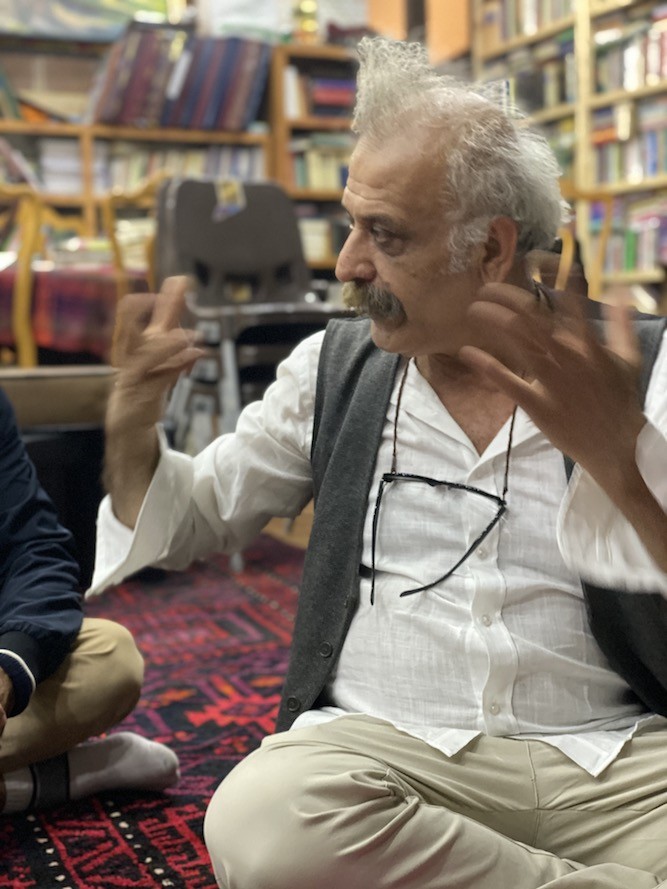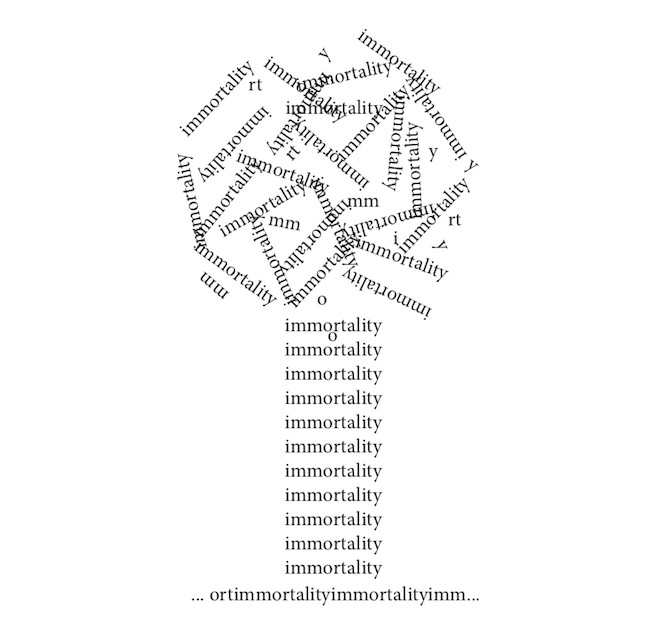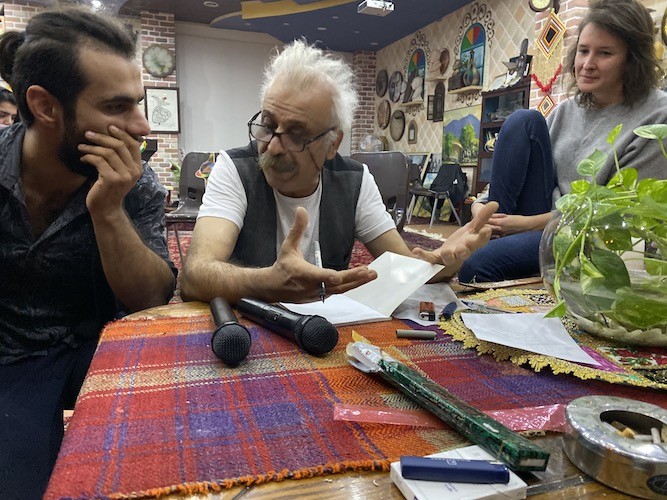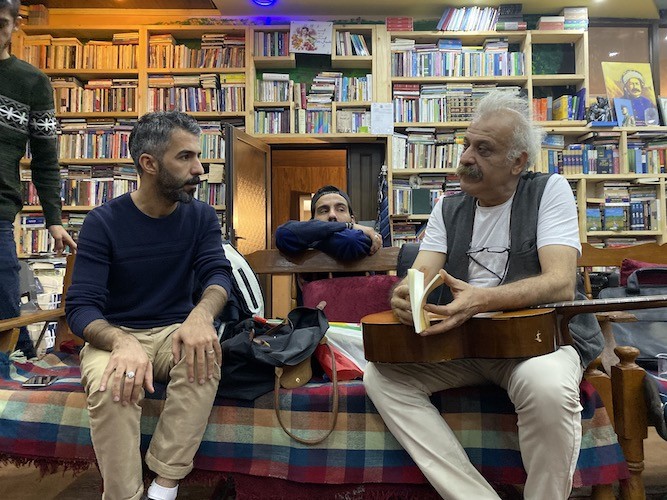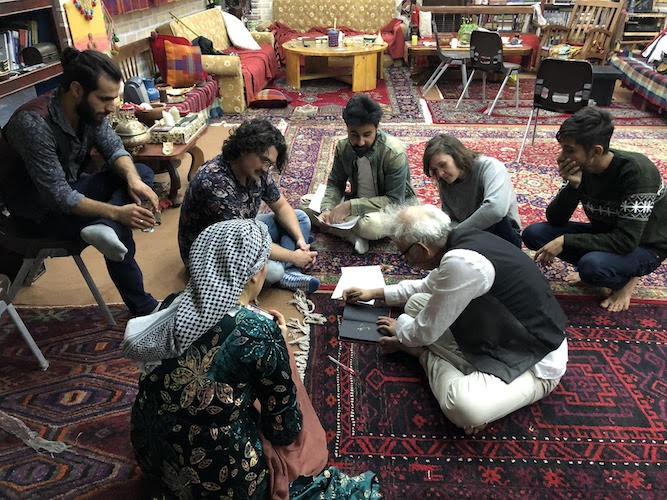A Poet Among Potato Eaters: An Introduction to Farhad Pirbal
BY Shook

What a lonely man I am, what a stranger:
Scared to die in this strange village!
—from “Tairawa / House Number 297”
A man steps directly into oncoming traffic on the road leading into Erbil International Airport. The driver of a white truck slams on its brakes, then attempts to skirt the figure, now jerking frantic kicks in his direction, shouting fiercely as he flaps his arms in the air. Farhad Pirbal, his signature mustache bulging like a wilder, unkempt heir to Flaubert’s, attracts dozens of honks and raised cellphones, documenting the latest of his wide-eyed misadventures for Facebook and YouTube, where they will certainly go viral. That afternoon, they do. The poéte maudit of Kurdistan, playing taxi matador, cursing his fellow Kurds for their inaction in opposing the Iranian and Turkish bombardment of the mountainous borderlands of Iraqi Kurdistan. Known for the past decade as much for his highly publicized antics as for his prolific literary output, Pirbal, who holds a doctorate in literature from the Sorbonne, is, by his own admission, not well. But in a region with extremely limited mental health resources, the tragedy of his longterm mental malaise has blossomed into full-blown, untreated illness. In a speech he gave in 2013, Pirbal himself indicted his fellow Kurds for their treatment of him: “Even the gypsies don’t leave behind their madmen, but the Kurds have left me behind.” Despite being one of Iraqi Kurdistan’s most accomplished poets and prose stylists, his mental illness has led to multiple stints in prison, the country’s closest thing to a psychiatric hospital.
Pirbal, born in 1961, may be the greatest innovator of Kurdish literature in the twentieth century, in both poetry and prose. His first collection, Exil, written between 1984 and 1990 in his hometown Erbil, the capital of the Kurdistan Region of Iraq known in Kurdish as Hewlêr, and Paris, displays the influence of the French surrealists and other European schools, an engagement with international literatures that Pirbal argues was essential to the development of early twentieth-century Kurdish literature. A restless experimentalist, he explores visual poetry in short poems in the shape of the Eiffel Tower—no small feat in the Kurdish orthography—and even introduces the calligram, in his depiction of a tree made from the Arabic word for “immortality”:
Pirbal’s close relationship with the visual arts seeps into his poetic oeuvre in other ways, too, with occasional incursions of handwritten statements and his invention of the Kurdish erasure poem, redacted with manual flourish, as in his radically counter-nationalist reimagining of the poet Dildar’s beloved 1930s anthem “Oh, Foe!,” whose last couplet inverts and truncates the original's militant declaration of Kurdish identity:
Don’t say the Kurds
are dead, the Kurdsare alive,
our flag is alive and bows before none.
His formal innovations extend to his stylized prose work as well. The pages of his 2001 novella Lieutenant Tahsin and More…, whose concept he first sketched out in Copenhagen in 1987, are split horizontally across their middles, recounting two versions of the titular lieutenant’s story, the first set during the day and the second set at night.
Pirbal’s earliest work displays a keen sense of nostalgia for simpler times, the Kurdistan of his boyhood recollections, before “the taste of moonlight and spirited songs [had] faded from the tablecloth.” Later in that same poem, titled with the address of his childhood home in Erbil, he laments, “What bad fortune! My childhood is far away, so far away; my death is even farther.” Like his contemporary Abdulla Pashew, his poetry is a chronicle of exile and displacement, longing and not belonging. The nine songs of his series “Romantic Songs While Abroad” catalogue the full range of his experiences during his years in Europe. The casual to-do list that is song five culminates in the question-exclamation of the precariousness that undergirds the exile’s every action, while song six asks a series of 20 questions about where the disoriented poet might presently find himself in Europe before a final question that reveals a wistful longing for the familiarity and beauty of his homeland, seen through his “smiling windows”:
5
Hem my pants
Button
Precipitation stops, meaning the weather is getting better
Call Hawre to get Hiwa’s address
Vestaport’s dense, empty forest
Rip up the letters, or burn them: and only keep my mother’s
Shoes, Shoemakers, Keys
Lars’s debts. Sell the refrigerator to Maria
All my IDs and documents
The train to Norway departs at eleven thirty at night
A letter to Aras in Munich
To Aram in Amsterdam
To Taha in Canada
And a letter to Baxa in Sablagh, telling him:
“I will leave here for good in a few days—
I still don’t know where to?!”
6
[…]
Am I still in that cold black swamp in Europe
or in the high-up, quiet
room
with my two beautiful,
smiling windows,
in the Tairawa neighborhood of Hewlêr?
By song seven, the poet engages in wistful bargaining, contrasting the supposed luxuries of France with a simple beauty of a childhood tree, before the entire series reaches its climax in a single couplet that reminds us—with the same sly grin Pirbal often flashes in real life—that a return to one’s homeland is not a return from exile, because there is no return from exile:
7
Your streets, oh Europe
Your gardens
Your leaders
Your museums
Your police men, young girls, women, windows, doors
Squares, cats, chimneys, boats, trains
Cars, fountains, airports, telephone booths
Banks, police stations, restaurants
Seashores, rooftops
Your dogs
Your passports
All of your things, oh Europe
I sacrifice them all for the tree in our front yard
9
I returned to Hewlêr to find my childhood
I bumped into my youth: it was getting old
In much of Pirbal’s post-European work, his poet-narrator traverses that unknown distance toward death, a stranger wandering an unfamiliar homeland, not unlike the wandering mystics of an earlier Kurdistan. He ends a poem from 1991 with a question that now seems to foresee his life’s own quandaries, posed equally to society and to poetry itself:
I walked with poetry—
Poetry, like me, was vagrant
Vagrant—
Where can we go?
***
While his early poems already displayed a characteristic compassion, by the mid-1990s he began to more directly advocate for social justice, as in his poem “1993”:
[…]
As long as the price of a shoe in Paris
is enough to feed 30 of the hungry in Siberia,
as long as 3 cold Swedish krona
is worth 33 days in the lives of 33 of the hungry in Somalia,
as long as the price of a Pepsi-Cola in Chicago
is worth the monthly salary of an employee
gone unpaid in Hewlêr, […]
…this world must be destroyed—entirely!
This insistence in the destruction of unfairness and inequality, an equally strong disdain of societal impositions on individual freedoms, and Pirbal’s willingness to so directly and so publicly speak his mind have invited trouble in Iraqi Kurdistan’s tense political arena. In a 219-line poem addressed to his son Rodan on his eighteenth birthday, he decries the varied enforcers of the establishment—inviting equal ire from statesmen and imams, newscasters and teachers, businessmen and members of the state security apparatus:
Your minders
With their Kalashnikovs
With their nice words
With their management meetings and their bureaucracies
With their radio, television, glasses, prayer beads, universities,
mosques, schools
Satellites, magazines and high walls…
They will not keep you safe
They will not keep you safe but
They are hiding from you
And they are waiting in ambush
They want to make you a copy of themselves
Make you their slave
[…]
Your minders teach you rhythms and rhyme
They teach you “My homeland, my homeland…”
They teach you the mosque’s five daily prayers
They teach you not to ever cross the red line
Your minders teach you not to ever fart in public
But being silent: that is not a problem
[…]
Your minders
Take away the paths before you and give you a chair
Take away the libraries and give you a prayer rug
Take away the sparkling light of electricity
And give you a bastard lantern
Take away a lover’s embrace and walks through the park
And give you Kurdistan’s flag
Take away love
And give you an album by Nancy Ajram
Take away intimacy, glances, whispers, dates, affection, eye contact
And give you a porno
Take away your travels
And give you a 15,000-square-kilometer playground
Take away your passport and
Give you a pill for the bird flu
Take away the sandgrouse, doves, lovebirds, and sparrows
And give you some reward
Take away protests
And give you a fake driver’s license
Take away hunger strikes and
Give you the month of Ramadan
Pirbal has also chosen to largely ignore regional political affiliations. After returning from Paris at the outset of the Iraqi Kurdish Civil War, doctorate in hand, to begin his teaching career at Salahaddin University, he maintained relationships with writers and publishers on both sides of Kurdistan’s primary political divide. Unusually for a writer from Erbil, whose populace is typically affiliated with the Kurdistan Democratic Party (KDP), many of his books were published in Slemani, three hours east toward the Iranian border, whose citizens are typically affiliated with the Patriotic Union of Kurdistan (PUK). Even after the newfound freedoms Kurdish literature and language enjoyed after emerging from the civil war, his groundbreaking novella Lieutenant Tahsin and More… proved too much for the PUK-affiliated Central Peshmerga Leadership Command, which joined the Kurdish Women’s Union to file a lawsuit against the author, accusing the work of disrespecting culturally hallowed peshmerga forces and women. Over 70 articles about the book appeared that week, and booksellers in every bazaar in Kurdistan hawked pirated editions of the sold-out novella at tenfold its original price. By then, Pirbal was so respected a figure that late party leader and beloved patriarch Jalal Talabani intervened, requesting the withdrawal of the lawsuit and even penning an editorial for Kurdistani News advocating for Pirbal’s freedom of speech.
More recently, Pirbal’s relationship to the political powers that be has primarily resulted in his persecution. His active social media presence has grown into a significant platform for disseminating his views, with over 250,000 combined Facebook likes and follows. His airport outburst took place in 2013, and he was arrested soon thereafter. The Erbil Police Department still catalogues the video of the incident on their official YouTube account. In 2016, Pirbal was arrested again, in his underwear, for attempting to urinate on the Appellate Court of Erbil, protesting the cronyism of both the dominant rival political parties. For many Kurds, his indictment rang true: “If you aren’t a whore or a bastard, they won’t give you a job opportunity. That’s why I raise my head. I piss on this government!” The following April, Pirbal was attacked by two young men, in what was widely presumed to be political retaliation. In 2018, the public prosecutor for Erbil requested the writer’s arrest, alleging he had received several complaints from the public about his behavior. Soon thereafter, Pirbal’s brother revealed that he had requested his sibling’s stay in prison, for his own protection, and asked the government, political parties, and public to protect Pirbal from politics. “He is sick and needs to be cured.”
***
In the predawn hours of July 14, 2019, Pirbal broke into the bookstore and offices of the Wafayi publishing house, which had recently announced that they would be publishing new editions of his complete works, in standalone volumes beginning with his seminal short story collection The Potato Eaters and his study of world literature The Literary Movements. Lit only by the glow of his cigarette and cellphone, he moved through the space, dousing books and desks with gasoline. On his way out, he flicked the cigarette’s cherry from its filter. The gasoline caught, and the bookstore burned to the ground. That morning, the poet freely admitted to the crime, which he claimed was just retribution for the publisher’s failure to pay him as agreed. In a public letter of apology, his brother attributed the behavior to addiction to unspecified drugs. After two months in prison, Pirbal was released on bail after making an initial payment toward the damages owed to his former publisher. Today he continues to live in Erbil, alone in a home cluttered with books and overflowing with his paintings, often made directly on the dwelling’s walls, and sculptures made of found objects. Though his work is widely known in Kurdistan, where his celebrity is such that he is recognized on the street, very little of his work in any genre has been translated into English, though the rising generation of Kurdish literary translators, including Pshtewan Kamal Babakir and Jiyar Homer, are beginning to turn their attention toward introducing his work to the wider world.
The title story from The Potato Eaters, one of the best known short stories of contemporary Kurdish literature, features a protagonist named Fereydun, who returns from 13 years abroad to find his home village has been forced by famine to eat solely potatoes, which they have learned to prepare according to infinite techniques, even producing potato wine. Eventually, they quit wanting to eat anything else. The community learns to make clothes from potato peels, and they hang portraits of their favorite potatoes on the walls of their homes. So great is their appreciation for the tuber that “Even when someone passed away, they washed his corpse with potato water. And in the end, planted a potato with him in his grave.” Received as a great writer, Fereydun is wined and dined for four days. After consuming the countless potatoes placed before him, he is finally able to reveal the contents of the bulging bag that he has carried with him on his long journey home. With a proud grin, Fereydun empties his sack of its host of gold coins, nuggets, and bricks. Confused, his father asks, “So, you haven’t brought us any potatoes from abroad?” Each family member repeats the question in turn, as Fereydun grows more exasperated, until he’s not sure if it is he or his family that has gone mad. Finally his father, clearly ashamed of his son, asks, “But what is this gold, my son? What is it good for?”
In a world where everyone prizes potatoes, Fereydun’s riches are a confounding embarrassment. Today, Pirbal’s are no less confounding. Like his character, he traveled the world, saving what gold he could to bring home. But Pirbal has no narrator to help us recognize him for the hero, for the sane man in a world gone mad.
—Poetry translations by Pshtewan Kamal Babakir and David Shook; prose translations by Jiyar Homer and David Shook
Poet, translator, and filmmaker Shook was raised in Mexico City. They earned a BA at the University...



